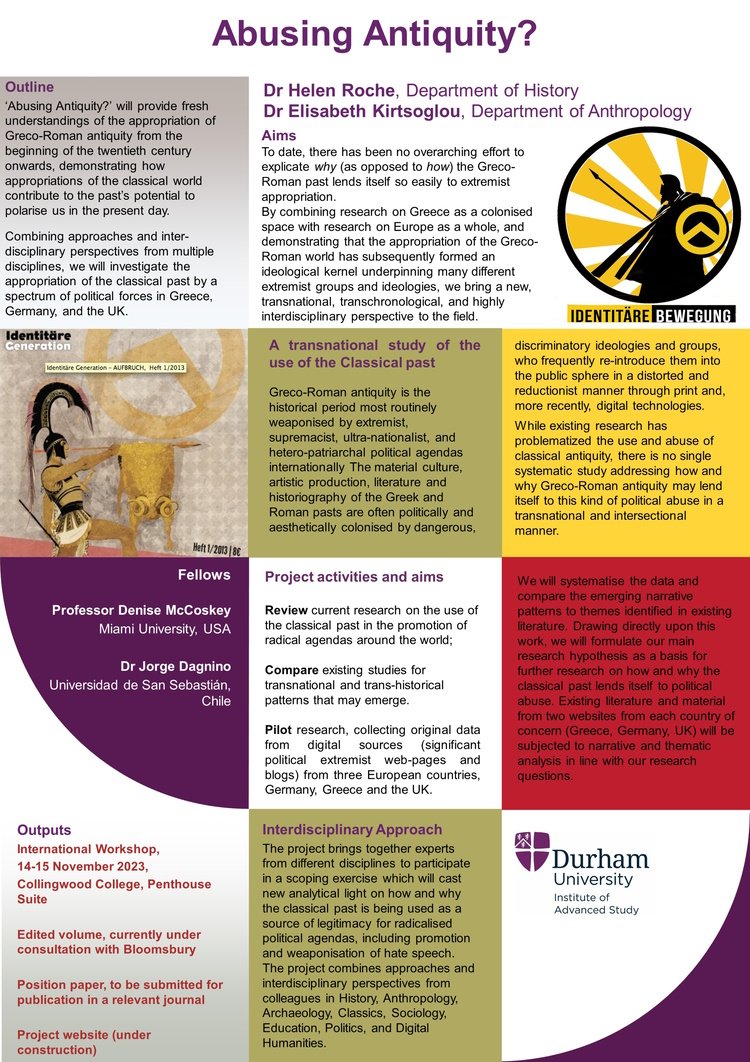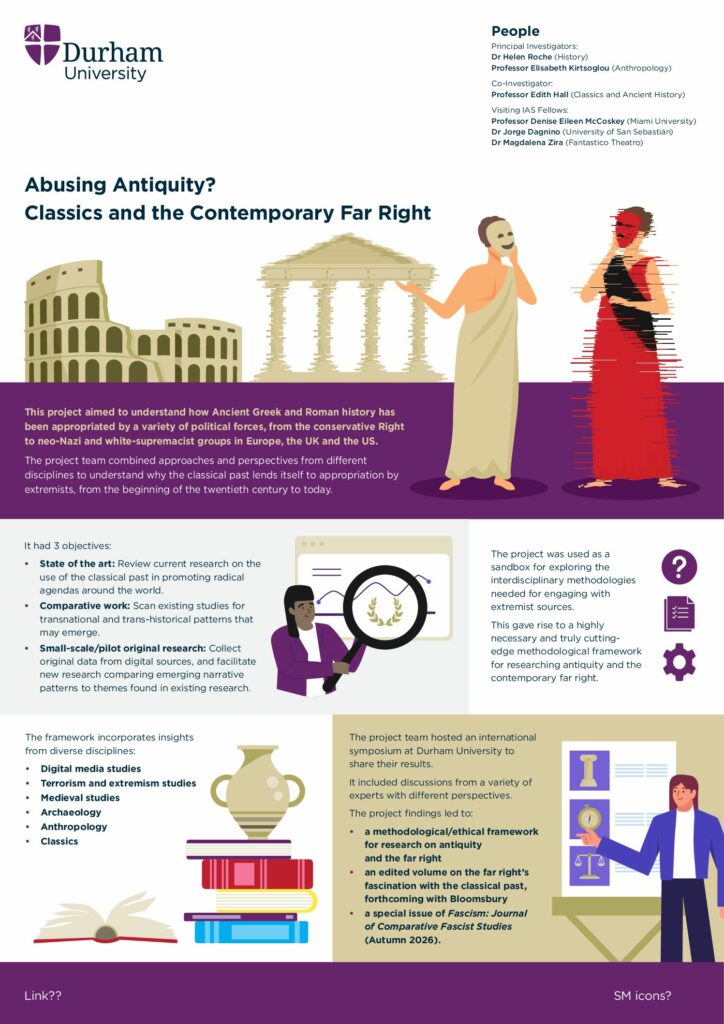IAS Major Project: 'Abusing Antiquity? Classics and the Contemporary Far Right'

The rise in visibility of the global far right over the last ten years has led to many scholarly discussions of how extremist narratives are formulated and circulated. This project aimed to interrogate one particular strand within such right-wing narratives: the use of ancient Greece and Rome – a topic which has not yet received comprehensive investigation.
In taking on this important, and often deeply unsettling, form of classical reception, we sought not only to interrogate the ways in which such appropriations operate from a range of perspectives, but also to examine how disciplinary structures have themselves been complicit in producing and reproducing politicised narratives about the ancient world.
In general, far-right appeals to the Greco-Roman past are used both to legitimise misogynist and masculinist ideals, and to bolster racist rhetoric and white supremacist calls for the establishment of Identitarian ethnostates and the protection of “White” culture, often using the dog-whistle of “Western Civilisation” as a form of shorthand.
The project also aimed to challenge classical scholars’ frequent attempts to position right-wing uses of antiquity as contrary both to ancient texts and previous academic interpretations, arguing that classicists must be prepared to reflect on the historical complicities of the discipline of classical studies itself as part of any attempt to combat such narratives. For instance, contemporary white nationalist discourse on the classics is often fundamentally rooted in nineteenth and early twentieth-century white supremacist ideas, including those peddled by terrorist groups such as the Ku-Klux Klan.
In taking on this extreme form of modern classical reception, the project sought not only to examine the forms and meanings of contemporary right-wing uses of antiquity, but also to place these within a longer-standing historical context, including their complicated relationship with the field of classical studies itself. These case studies can help us as a society to understand how and why people identify with right-wing extremist movements, and find their ideas plausible – a key aim of research on political extremism more generally.
Such analysis can also help us to comprehend how historical narratives can be weaponised in ways which, at their most extreme, cause real violence, or even promote lethal terrorist activity. All in all, the project aimed to provide a more robust view of how such far-right narratives are produced and perpetuated, and thus to contribute towards developing more effective methods by which they can be countered.
Overall, the project was extremely successful in bringing together researchers from a wide range of disciplines, working on a broad spectrum of transnational case studies. PI Dr Helen Roche was then able to use these discussions to construct a new interdisciplinary framework for studying far-right appropriations of antiquity by providing a survey of the methodological and ethical best practices necessary for working with such material, including how to treat online sources and safeguard researchers’ wellbeing, which will be invaluable when moving forward with further primary-source research.
The main research output from the project will be an edited volume entitled Abusing Antiquity? Classics and the Contemporary Far Right (under consideration by Bloomsbury); however, we are also planning a special issue of Fascism: Journal of Comparative Fascist Studies, incorporating essays which speak to the longer-term continuities which exist between classicising neo-fascism and twentieth-century fascist appeals to antiquity.
Three reviews inspired by the project are also forthcoming in Arion, the Journal of Anthropological Research, and the Journal of the Royal Anthropological Institute. In terms of outreach and public engagement, Helen Roche was also interviewed about the project by Konstantinos Poulis, a leading journalist with the Athens-based ‘Press Project’, gaining over 13,500 views to date.
Although we ended up using the project less as a vehicle for pilot research using original extremist sources, and more as a sandbox for exploring the interdisciplinary methodologies necessary when engaging with such contested material, this aspect of the project ended up giving rise to a highly necessary and truly cutting-edge methodological framework, incorporating insights from such diverse disciplines as digital media studies, medieval studies, and anthropology.
Ultimately, we believe that the work to which the project has given rise has the potential to be ground-breaking and world-leading both within and beyond the field of classical reception studies, and we are deeply grateful to the IAS for giving us both the space and the opportunity to engage with this disturbing yet crucial topic.
—

